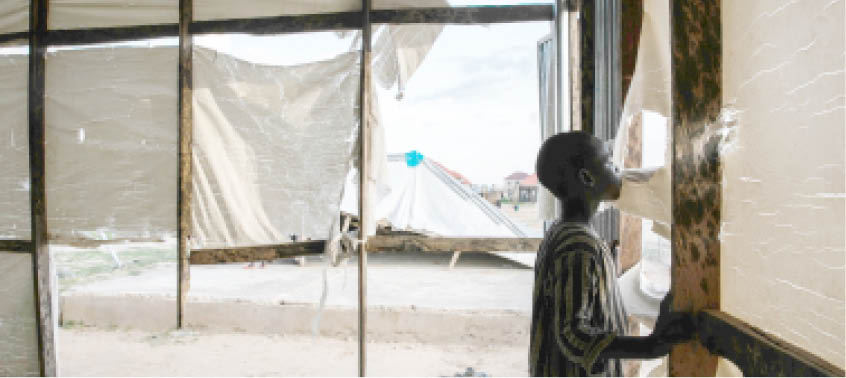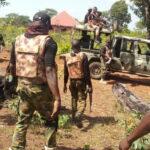Since 2009, the alterations between the Boko Haram sect and the Nigerian government has resulted in the death of thousands and a displacement of millions; a level of devastation on a scale unheard of since the 1960s during the Civil War. The Boko Haram conflict has subsequently spilled to neighbouring countries such as Niger, Chad and Cameroon. This intensified the efforts by the Nigerian Army, Nigerian Air Force and Nigeria Police Force, the formation of vigilante and hunter groups, and the resuscitation of the Multinational Joint Task Force, to coordinate a joint pact to fight the insurgency across borders. Although many successes in the fight against the terrorist group has been recorded, the conflict continues to this day. Similarly, the humanitarian crisis as a result of the ongoing violence of Boko Haram conflict has caused displacement, food shortages, emotional and physical trauma in many communities.
One of the many impacts of the Boko Haram insurgency, which to a great extent has affected the North East of Nigeria, has been the psychological effect on a large number of children in this region. Many children have been killed, some abducted, others involuntarily recruited into the terrorist group, and millions internally displaced across West African countries. For this reason, the Boko Haram conflict is regarded by many reports as one of the deadliest for children; the unending conflict has taken a devastating toll on the lives of children.
- Rivers State 2023: Homily for Amaechi’s ‘Return’
- Disquiet over FG’s approval of N2.9bn for printing exam materials
In 2014, Boko Haram came to international limelight after the abduction of 270 school girls in a boarding school in Chibok Local Government Area of Borno State. This news heralded the beginning of intense activism for the release of the school girls. Later, a global campaign saw former First Lady of the United States, Michelle Obama holding a photo of the hashtag that activists in Nigeria had coined to show support for the Chibok girls; #BringBackOurGirls. Again, in 2018, 110 girls were abducted in a school in Dapchi, Yobe. There was more worldwide outrage.
While activists and organizations were solely focused on the abductions of women and girls, especially the Chibok girls in Borno State and the girls in Dapchi, Yobe State, the Islamist group was quietly abducting a massive number of boys. Thousands of boys have disappeared since the beginning of the Boko Haram insurgency 11 years ago. Some were abducted or killed by the terrorist group; others have been detained by the Nigerian military and never heard from again. Men and boys have become targets to both parties of the conflict; Boko Haram and the Nigerian military.
Fortunately, some are being rescued by the Nigerian military. However, the Nigerian military, which has been responsible for the rescue of these boys have sadly, been accused by Amnesty International of detaining many of the children. The double bind of being a child soldier and a victim of the conflict plagues the abducted boys of the Boko Haram insurgency. The boy child in Borno State, like many other children in various countries around the world plagued by war and under constant attack, are scarred for life.
In reality, thousands of children, mainly boys, have been held at detention in Maiduguri confined with adults as ‘suspects’ with ties to the Boko Haram sect and consequently enduring many harrowing adversities; physical and emotional trauma. Till this day, majority are still missing. There is an ongoing search for others. According to a 2018 UNICEF report, the conflicts in Syria, Yemen, South Sudan, and now Nigeria, have had major psychological impacts on young boys. Sadly, there have been no hashtags for the men and most importantly the young boys as they suffered untold hardships. There are, also, no safe spaces for men and boys in camps.
In current times, many young boys have returned to Maiduguri, the state capital of Borno after months in terrorist captivity in neighbouring villages around the state. A rehabilitation programme created by the Nigerian military called “Operation Safe Corridor” has taken many men and boys to the military barracks for intensive questioning and analysis before being herded in trucks to the neighbouring Gombe State. The programme and premises, heavily guarded, has barred many journalists, researchers and specific international organizations from entry. The methods of rehabilitation are not publicly disclosed.
Ultimately, the multitude of boys returning from the ‘rehabilitation’ programme are brought unaccompanied to internally displaced persons camps, and are left with unresolved physical and emotional scars. The rehabilitation of these boys is still not a top priority as it is for female victims such as the Chibok girls who have garnered worldwide outrage and empathy. Many of the girls are currently in private schools both in Nigeria and in the United States. A photo of the Chibok girls with US President Donald Trump was also released in 2017. The response to the plight of the boys remains unaddressed locally and globally.
In contrast, the boys who were involuntarily recruited have become stigmatized, labeled as terrorists and are relegated to the background by mental health workers and aid organizations after a while. Truly, this population of boys requires a special focus. In the same way the issues of the abducted girls were addressed, Nigeria needs to offer the boys safe spaces for necessary psychosocial support to start the healing process.
The Nigerian government’s response in terms of psychosocial support, rehabilitation and deradicalization for boys captured by Boko Haram as child soldiers still remains insufficient. The treatment of children as suspects and their detention with adults has created more problems as cases of physical abuses have been reported. In essence, boys who were abducted and forcibly used by Boko Haram should be treated adequately by trained mental health professionals as victims and survivors. Sustainable children focused trauma care is highly necessary. Many boys languish in camps for internally displaced people with inadequate health care, food or educational prospects; a situation that harms their ability to become fully functional young adults. This in turn will create emotionally unstable and unemployed adult men in the future. In the end, will affect us all.

 Join Daily Trust WhatsApp Community For Quick Access To News and Happenings Around You.
Join Daily Trust WhatsApp Community For Quick Access To News and Happenings Around You.


